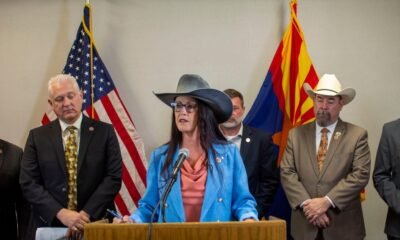Arizona Legislature
State Republicans Push for Party Labels on School Board Ballots

A new legislative measure in Arizona is set to place the political affiliations of school board candidates front and center on ballots, igniting a contentious debate about the role of politics in education.
Currently awaiting discussion in the House, the proposal mandates that starting next year, voters will see candidates’ party affiliations as registered 150 days prior to elections.
Supporters, including Republican Rep. Matt Gress, argue that the move demystifies the political landscape of school board races, which have increasingly seen party influence. He asserted, “That bus has left the yard,” emphasizing that parties have already taken sides in recent elections.
Critics, however, contend that the legislation exacerbates partisanship in educational decisions, with concerns it shifts focus away from student needs. Notably, Democratic lawmakers have uniformly opposed the bill, while Republicans have shown unanimous support.
Sen. Mark Finchem raised doubts about the nonpartisan nature of school board elections, suggesting that the existing framework might be a façade masking political motivations. His comments reflect a growing sentiment that education issues are increasingly intertwined with partisan politics.
Since 2022, efforts to introduce similar measures have failed, notably when Democratic Gov. Katie Hobbs vetoed a previous version of the bill, citing concerns about heightened political polarization. She stated, “Partisan politics do not belong in Arizona’s schools.”
This legislative push is now led by Sen. Carine Werner, a member of the Scottsdale Unified School District governing board. She argues voters deserve clarity about candidates’ political alignments to make informed decisions.
In recent elections, organizations like Stand for Children and the Arizona Education Association have poured resources into supporting candidates aligned with Democratic values, highlighting the increasing overlap between education and political campaigning.
Though some, like Sen. Analise Ortiz, advocate for voter independence in researching candidates, others assert that revealing party affiliation could facilitate informed voting. Sen. John Kavanagh pointed out that, especially in modern politics, party labels serve as essential identifiers for voters.
However, concerns about potential negative impacts of partisan elections linger. Ortiz referenced a study from the University of Georgia indicating that districts with partisan school board elections may experience high teacher turnover and reduced per-pupil spending. She urged caution, considering Arizona’s existing teacher shortages.
Despite the controversy, supporters maintain that adding party affiliation to ballots does not inherently politicize school governance further than it already is. They contend that voters deserve transparency regarding candidates’ underlying ideologies.
As the bill moves through the legislative process, its future remains uncertain, especially given the governor’s previous stance against similar proposals.

















